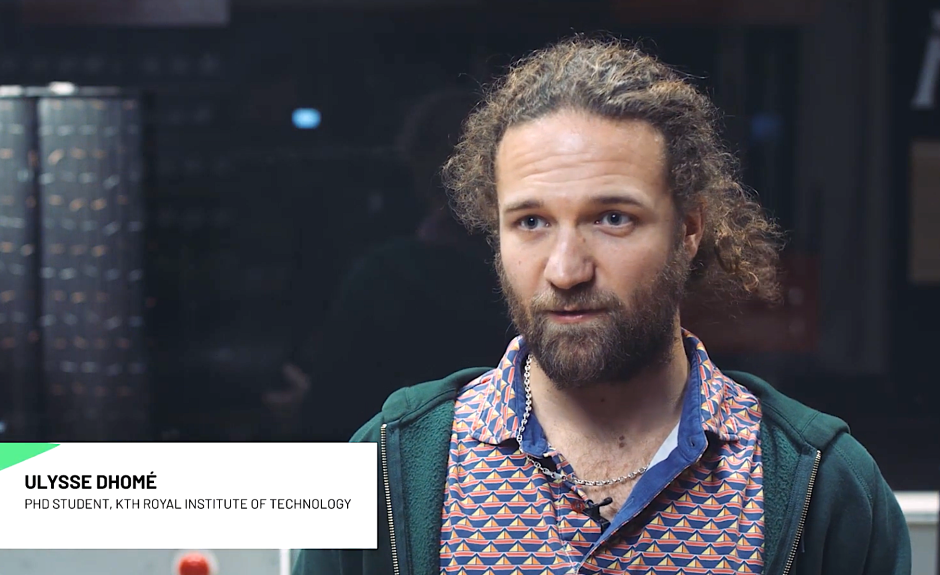He’s teaching computers to sail

Humans have been sailing for thousands of years, but that experience and knowledge aren’t enough when designing the car carriers of the future. It’s time to hand over the helm to computers. Ulysse Dohmé is one of the researchers making this happen.
“I feel at my best when I’m at sea. Plus, I enjoy physics, especially fluid mechanics. I can spend hours under a bridge, fascinated by the currents in the water,” says Ulysse Dohmé.
This passion has been with him since childhood. He remembers summers when his family left Paris for his grandfather’s summer house on the Atlantic coast.
“There was a fishing harbor and a few shipyards. In 1998, when I was six years old, a supply ship was being built at one of the yards. I often went to watch it take shape. I still have newspaper clippings about the ship, which happened to be named Ulysse. Since then, I’ve wanted to build ships.”
Although shipbuilding was a clear passion, Ulysse had many interests. According to a school assignment titled “When I Grow Up”, he wanted to be a singer, baker, magician, caveman, chicken farmer, scientist, sailor (he even dreamed of sailing underwater around the world in 80 days), and shipbuilder. A quarter-century later, notes from that assignment are photocopied in the preface of his doctoral dissertation in marine technology, which he defended at KTH Royal Institute of Technology in October.
“There aren’t many opportunities to study naval architecture in France, but I like traveling and experiencing new cultures. I came to Sweden in 2016 without knowing much about the country, except that it’s cold—which suits me, as I’m always warm.”
What was supposed to be a one-year exchange at KTH became permanent.
“I started working on Professor Jakob Kuttenkeuler’s project on the sailing drone Maribot Vane simply because I had the time and thought it sounded fun. I enjoyed working with Jakob, which led to me writing my master’s thesis on Maribot Vane. I then became a research engineer and wanted to pursue a PhD, but that required a larger project.”
The wPPC (wind-Powered Car-Carrier) project, funded by Trafikverket with 27 million SEK, provided the opportunity. Since 2019, Ulysse has been involved in the project, where Wallenius Marine, KTH, and RISE (formerly SSPA) are developing the concept vessel Oceanbird—a wind-powered car carrier with space for 7,000 cars, scheduled to launch in three years. Making such a ship sail is a significant challenge. The concept involves 40-meter-tall wing sails (six in total) that can be extended, tilted downward, or folded as needed. How can they work as efficiently as possible together?
This is the main question Ulysse Dohmé’s dissertation addresses. It involves utilizing wind between 50 and 100 meters above the ocean—an area previously rarely explored and one that remains poorly understood by researchers. The ship will also need to “chase” strong winds, giving the term “route optimization” a whole new meaning.
“It’s completely different from sailing a small vessel. There are so many forces and variables to consider that it’s too complex for humans. That’s why we need to teach a computer to sail.”
He compares it to an airplane.
“Planes are fast, with two wings always meeting the wind from the same direction. A relatively simple system. But getting a ship carrying 7,000 cars to navigate oceans using six wings encountering wind from various directions is a completely different story.”
“It’s something we can calculate, but making it work in reality is a big challenge. Even measuring wind flows is extremely difficult, and we need more tests before reaching the goal. Since we’re in new and unknown territory, not everything can be solved with AI and machine learning. A variety of interdisciplinary tests are required. But I think progress will come quickly. Next year, we’ll test one wing on a ship. Hopefully, it will confirm our calculations, and then it’s just a matter of building the vessel.”
After completing his PhD in October, Ulysse continues to work on the project, now as a postdoctoral researcher employed by Wallenius Marine.
“It’s a great company with many interesting projects. They’re not just profit-driven. Even before shipping faced demands to transition, they were already working toward emission-free operations.”
What about the future? Will he stay in Sweden?
“Yes, both my partner, who’s from Italy, and I enjoy living in Sweden, especially the work environment. When we hear about how our friends are treated at work back home, we don’t miss it. Here, people genuinely care about their employees. The only thing I miss is French food. When I’m in France, I gorge on cheese, bread, and other things so I can last a while,” says Ulysse Dohmé and laughs.
-
 DNV: Metanol är ett moget alternativt bränsle
DNV: Metanol är ett moget alternativt bränsle -
 Se Hållbar sjöfarts uppsamlingsheat
Se Hållbar sjöfarts uppsamlingsheat -
 NextWave – en podd som ska locka unga
NextWave – en podd som ska locka unga -
 Ny studie: Eldrivna pendelbåtar kan effektivisera Stockholms kollektivtrafik
Ny studie: Eldrivna pendelbåtar kan effektivisera Stockholms kollektivtrafik -
 Sjöfartens utsläpp ökar
Sjöfartens utsläpp ökar -
 Sociala relationer påverkar val av bränsle
Sociala relationer påverkar val av bränsle -
 Sjöfartens omställning kräver ”mjukare” påtryckningar
Sjöfartens omställning kräver ”mjukare” påtryckningar -
 Hon hade avtalad tid med Kapten ynkrygg
Hon hade avtalad tid med Kapten ynkrygg -
 Lighthouse omvärldsanalys 2025 – osäkerhet och tullar präglar sjöfarten
Lighthouse omvärldsanalys 2025 – osäkerhet och tullar präglar sjöfarten -
 Se seminariet Shipping in the Marine Environment
Se seminariet Shipping in the Marine Environment

